ABSTRACT
The Indonesian Ministry of Agriculture has established Indonesian Farmers’ Shops under the Community Food Business Development Program as one of the market initiatives in the country. It is carried out as an effort to maintain the stability of prices and to shorten supply chains of strategic staple food efficiently. The program was started in 2016 covering 4,155 Farmer’s Shops throughout Indonesia. This market initiative has developed e-commerce business model to capture opportunities through the virtual supply chain trade. Prominently, Farmer’s Shop plays an important role in the food supply chain amidst the implementation of the large-scale social restriction policy towards preventing Covid-19 pandemic case in Indonesia.
Keywords: agriculture, market, farmer’s shop, Indonesia
INTRODUCTION
Agricultural market plays an important role in stimulating production and encouraging consumption as well as in accelerating the swiftness of economic development. The dynamic functions are of primary importance in achieving marketable surplus and improving income of farmers. This may include, among other things, agricultural market initiative. There are some aspects related to agricultural market initiatives that are in line with regulations, innovations, and opportunities. In response to this, the Indonesian Ministry of Agriculture (MoA) has established /Indonesian Farmer’s Shop within Indonesian Farmer’s Shop Center aimed at facilitating network access among farmers, financial institutions, and transportation system. The Farmer’s Shop is under the Community Food Business Development Program involving Community Food Business Institution, Farmer’s Group, and Farmer’s Group Federation toward stabilizing price at producer and consumer levels, shortening supply chains, facilitating accessibilities of food supply and price for consumers, and altering market structure benefited producers.
This article aims at discussing agricultural market initiative based-farmers shop in Indonesia. It entails the rationale, framework, implementation, as well as opportunity and challenges to support agricultural development in the country.
RATIONALE
Food supply and price are interrelated strategic indicators which are frequently used to determine: (1) Food distribution status; (2) Food supply chain; and (3) Food unavailability. The main problem is the high price disparity between producer and consumer effect on disproportionate profit among business actors. The high price at consumer level does not guarantee farmers get an appropriate price. Therefore, it is required to generate favorable price both at the producer and consumer levels.
As a permanent solution to overcome food price disparity, the establishment of Farmer’s Shop under the Community Food Business Development Program is carried out as an effort to maintain the stability of price and to shorten supply chain of strategic staple food efficiently. It covers nine staple food packages (sembako) comprising: (1) rice; (2) sugar; (3) vegetable/fruit(s); (4) meat; (5) cooking oil; (6) milk; (7) eggs; (8) kerosene or LPG; and (9) salt. This indirectly plays a role to overcome the low price throughout the peak season (over supply) and high price during off-season (less supply).
FRAMEWORK
The program of Community Food Business Development is conducted by the Food Security Agency of the Indonesian Ministry of Agriculture (MoA). It is aimed at: (1) Supporting farmers to obtain better selling price; (2) Enhancing capacity of farmers to acquire added value of production towards welfare improvement; (3) Assisting farmers to come up with favorable marketing of food products; and (4) Helping consumers to purchase good quality of food commodity at affordable price. Institutionally, the Community Food Business Development Program involves certain organizations (Box 1).
|
Box 1
Institutional Community Food Business Program
Community Food Business Development Program is a program to empower Community Food Business Institution, Farmer’s Group, Farmer’s Group Federation, and other community business organizations engage in serving Farmer’s Shop toward maintaining supply and price stability.
Community Food Business Institution is a developed joint community business institution that includes Farmer’s Group, Farmer’s Group Federation, and other community business organizations with legal structure entity and business oriented.
Farmer’s Group is a group of farmers on the basis of shared interests, environment, socioeconomic, resources, and commodities to develop agribusinesses.
Farmer’s Group Federation is a legal entity of collective Farmer’s Groups to join and work together to increase economies of scale and efficiency.
Indonesian Farmer’s Shop includes shop/stall/kiosk owned by individual or institutional traders who have experience in agribusiness and determined by Community Food Business Institution to sell strategic commodities as well as to carry out partnership with industry at affordable prices according to the provisions of Community Food Business Development Program.
Indonesian Farmer’s Shop Center is a distribution center to connect Farmer’s Shop and Farmer’s Group/Farmer’s Group Federation in large-scale agribusinesses.
|
Within Community Food Business Development Program, farmers would gain an alternative marketing channel through Community Food Business Institution (Box 2). It facilitates guaranteed price in accordance with government purchasing price or applicable reference price by taking into account profit margins appropriate for farmers. In addition, this pattern will also provide certainty for the availability of managed and guaranteed sustainability of food supply to Farmer’s Shop. Institutionally, it is coordinated with Ministry of Trade, National Logistics Agency, and other relevant institutions (Figure 1).
|
Box 2
Rice Supply Chain (Traditional Market vs. Farmer’s Shop)
As an illustration, the supply chain of rice in Indonesian traditional market is commonly quite long (Setiaji and Wahyuni, 2019). It involves seven actors as follows: (1) Farmers; (2) Rice Milling Unit and Collector; (3) Distributor and Sub-distributor; (4) Agent and Sub-agent; (5) Wholesaler; (6) Retailer; and (7) Consumer. Consequently, rice market price would be higher. Meanwhile, rice supply chain through Farmer’s Shop simply includes four actors, namely: (1) Farmer (producer); (2) Community Food Business Institution (buyer and supplier); (3) Farmer’s Shop (retailer); and (4) Consumer. Therefore, the price of rice would be lower and farmer as producer would be able to obtain the profitable agribusiness.
|
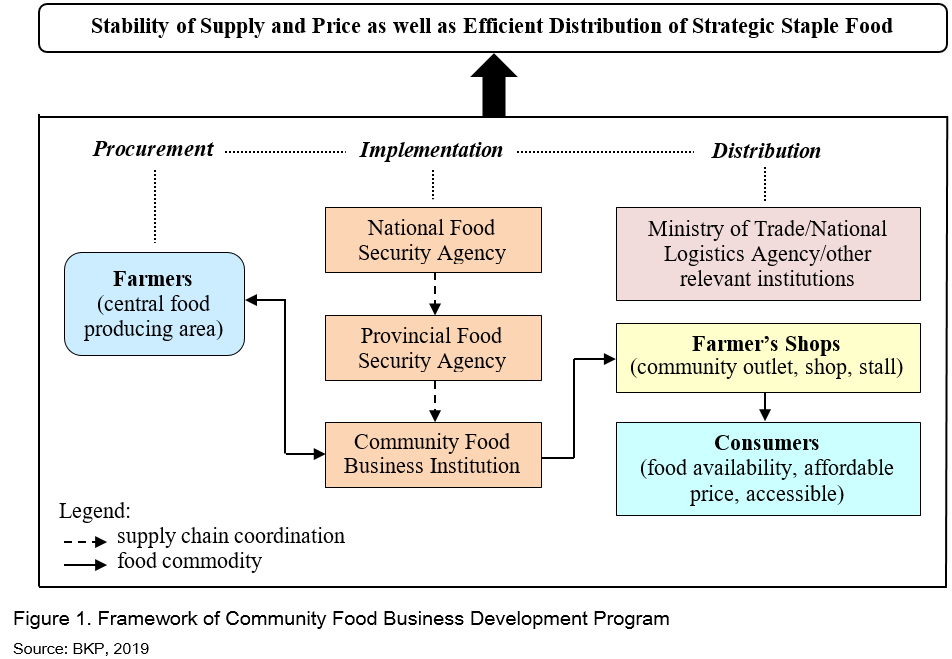
IMPLEMENTATION
The Community Food Business Development Program has been implemented since 2016 covered 493 Community Food Business Institutions for rice commodities in 31 provinces. In 2017, it included 406 Community Food Business Institutions with additional commodities (chili and shallot) in seven provinces. In 2018, there were 500 Community Food Business Institutions for rice commodities in 16 provinces. Up to 2018, 21 Farmer’s Shop Centers had been established in Jakarta and other provinces. The Farmer’s Shop Center is conceptually designed as a hub and prototypically developed in several major cities in Indonesia. It is possible to promote Community Food Business Institutions, Farmer’s Group Federations, and other food producers committed to stabilize food supply prices. Since 2016 up to 2019, there were 4,155 units of Farmer’s Shop and 1,832 units of Farmer’s Group Federation assisted by 1,848 persons of technical assistant (Table 1).
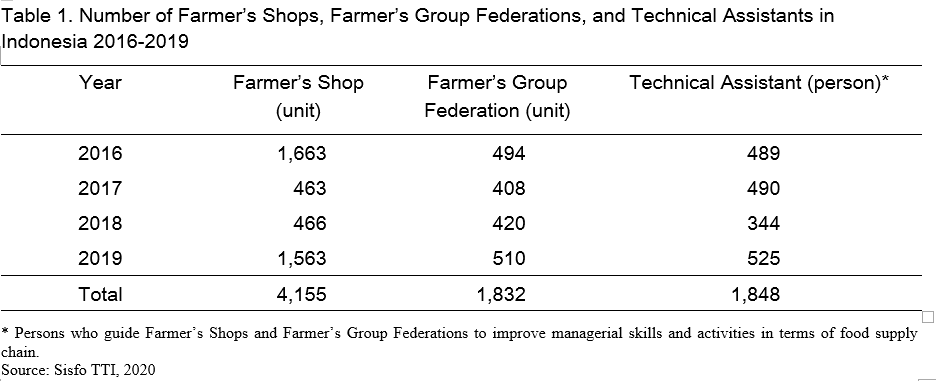
The activities of Community Food Business Development Program are classified into four categories, namely: (1) Growth stage; (2) Developed stage; (3) Fostered stage; and (4) Independent stage (Table 2). The growth, developed, and fostered stages receive government funding in 2019, while independent stage has no longer receive government funding.
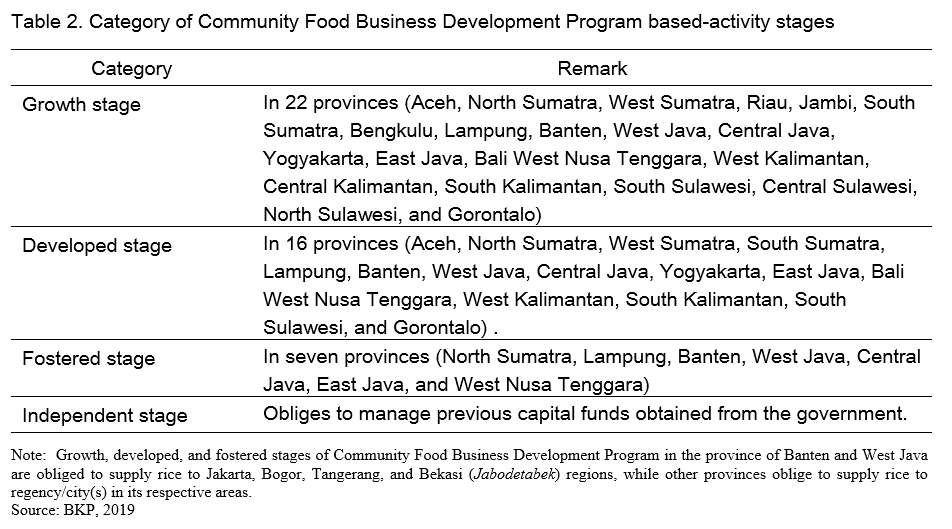
OPPORTUNITY AND CHALLENGES
In line with digital era, the Community Food Business Development Program developed e-commerce model to capture market opportunities through virtual supply chain trade in 2019. It was implemented in 10 provinces (North Sumatra, South Sumatra, Lampung, Jakarta, West Java, Central Java, Bali, West Nusa Tenggara, and South Sulawesi). In this model, farmers sell food products to Community Food Business Institution and supply it to Farmer’s Shop through e-commerce application (Figure 2).
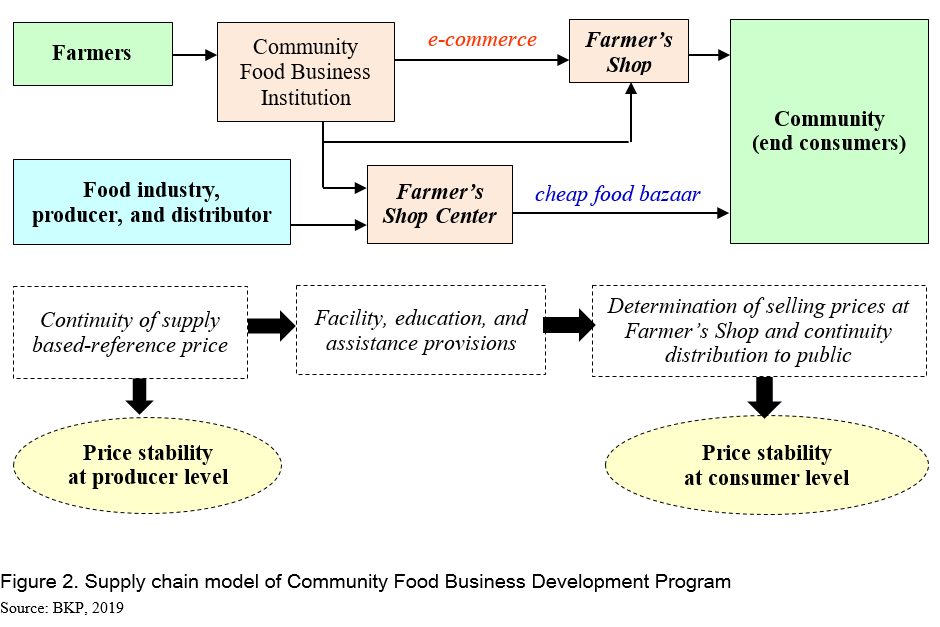
The e-commerce is managed by Provincial Food Security Agency in collaboration with application provider (Figure 3). It includes the certain roles. First, National Food Security Agency monitors activities both at Community Food Business Institution and Farmer’s Shop activities including transaction substances through dashboard served by the application provider. Second, Farmer’s Shop organizes activity order using application and Community Food Business Institution accepts the order prepared by Farmer’s Shop through application according to its coverage area (Farmer’s Shop and Community Food Business Institution can directly communicate related to shipping details, the quality of the commodity to be supplied, and the delivery schedule). Third, Provincial Food Security Agency has a task to monitor the activities of Farmer’s Shop and Community Food Business Institution as well as transaction activities through dashboard by application provider (the Provincial Food Security Agency has also an additional task to increase the supply quantity by enhancing the number of Farmer’s Shops in each province). Fourth, application provider is responsible to technical aspects related to application design, development, and maintenance as well as other technical matters.
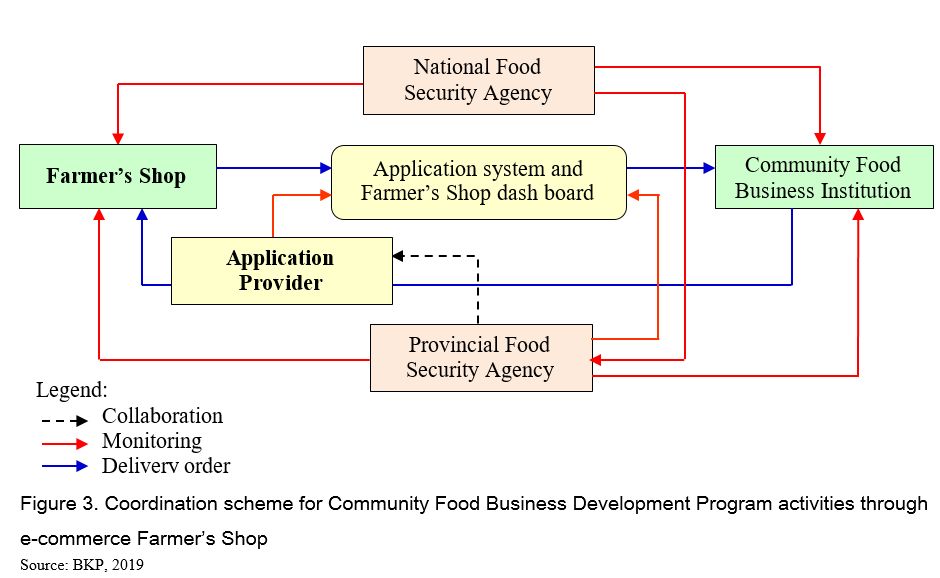
The e-commerce is quite prospective in Indonesia. It is not only to facilitate farmers in marketing agricultural products but also to attract the interest of young generation in agriculture. This business type might be able to assist farmers to go through structured market based-transparency. It is quite promising since there are numerous mobile subscriptions in Indonesia (Figure 4). The mobile phone could be a breakthrough for farmers where applications are used for agricultural marketing and creates awareness on the market prices as well as the demand of agriculture produce.
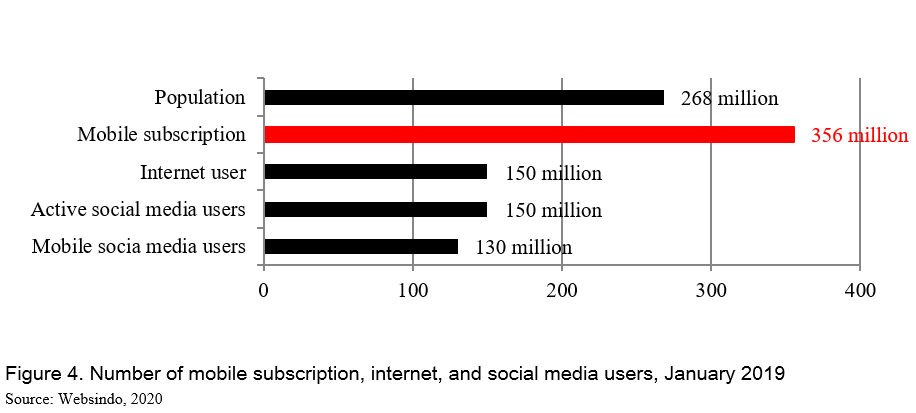
Recently, Farmer’s Shop plays an important role during the implementation of the Large-scale Social Restriction Policy in preventing the Covid-19 pandemic case in Indonesia. It is carried out in collaboration with Gojek (online transportation service) covering certain commodities (rice, poultry meat, beef, egg, cooking oil, sugar, chili, shallot, and garlic) with lower price compared to market price. The transportation cost is under the responsibility of Indonesian MoA. The provision of subsidiary transportation cost is particularly along with the implementation period of the Large-scale Social Restrictions policy response towards Covid-19 pandemic case in Indonesia. This collaboration would be implemented in 3,500 Farmer’s Shops throughout the country (Trubus.id. 2020).
CONCLUSION
Food supply chain tends to be long and inefficient which has a consequence of high market price in Indonesia. The supply chain through Farmer’s Shop, considered as one of agricultural market initiatives, would simply shorten food distribution from farmer/producer(s) to consumers with a lower price compared to market price. In line with digital era, the implementation of e-commerce within Farmer’s Shop is quite perspective in order to assist farmers to go through structured market based-transparency. This market institution not only plays an important role in food supply chain along peak season and off-season but also contributes during the Covid-19 pandemic case. The latter is recently prominent contribution in line with linking producers and consumers in a more simple way amidst the large-scale social restriction policy implemented in the country.
REFERENCES
Anugrah, I.S. and S. Wahyuni. 2019. Toko Tani Indonesia: National Program for Shortening Rice Supply Chain. Proceedings of the International Conference on Trade 2019 (ICOT 2019). Series: Advances in Economics, Business and Management Research, Volume 98. The 3rd International Conference on Trade (ICOT 2019). Atlantis Press. https://www.atlantis-press.com/proceedings/icot-19/125918448 (8 April 2020)
BKP. 2019. Petunjuk Teknis Kegiatan Pengembangan Usaha Pangan Masyarakat melalui Toko Tani Indonesia (Technical Guidance of Community Food Business Development through Indonesian Farmer’s Shops). Badan Ketahanan Pangan (Food Security Agency). Indonesian Ministry of Agriculture. Jakarta.
Sisfo TTI. 2020. Sistem Informasi Toko Tani Indonesia (Information System of Indonesian Farmer’s Shops). Indonesian Ministry of Agriculture. http://tti.pertanian.go.id (31 March 2020).
Trubus.id. 2020. Lancarkan Distribusi Pangan di Tengah Covid-19, Kementan Gandeng Gojeg (The Indonesian Ministry of Agriculture in Collaboration with Gojek towards Streamlining Food Distribution). https://news.trubus.id/baca/36141/lancarkan-distribusi-pangan-di-tengah-covid-19-kementan-gandeng-gojek (8 April 2020)
Websindo. 2019. Indonesian Digital 2019. https://websindo.com/indonesia-digital-2019-tinjauan-umum/ (4 February 2020).


Agricultural Market Initiative Based-Farmer’s Shop in Indonesia
ABSTRACT
The Indonesian Ministry of Agriculture has established Indonesian Farmers’ Shops under the Community Food Business Development Program as one of the market initiatives in the country. It is carried out as an effort to maintain the stability of prices and to shorten supply chains of strategic staple food efficiently. The program was started in 2016 covering 4,155 Farmer’s Shops throughout Indonesia. This market initiative has developed e-commerce business model to capture opportunities through the virtual supply chain trade. Prominently, Farmer’s Shop plays an important role in the food supply chain amidst the implementation of the large-scale social restriction policy towards preventing Covid-19 pandemic case in Indonesia.
Keywords: agriculture, market, farmer’s shop, Indonesia
INTRODUCTION
Agricultural market plays an important role in stimulating production and encouraging consumption as well as in accelerating the swiftness of economic development. The dynamic functions are of primary importance in achieving marketable surplus and improving income of farmers. This may include, among other things, agricultural market initiative. There are some aspects related to agricultural market initiatives that are in line with regulations, innovations, and opportunities. In response to this, the Indonesian Ministry of Agriculture (MoA) has established /Indonesian Farmer’s Shop within Indonesian Farmer’s Shop Center aimed at facilitating network access among farmers, financial institutions, and transportation system. The Farmer’s Shop is under the Community Food Business Development Program involving Community Food Business Institution, Farmer’s Group, and Farmer’s Group Federation toward stabilizing price at producer and consumer levels, shortening supply chains, facilitating accessibilities of food supply and price for consumers, and altering market structure benefited producers.
This article aims at discussing agricultural market initiative based-farmers shop in Indonesia. It entails the rationale, framework, implementation, as well as opportunity and challenges to support agricultural development in the country.
RATIONALE
Food supply and price are interrelated strategic indicators which are frequently used to determine: (1) Food distribution status; (2) Food supply chain; and (3) Food unavailability. The main problem is the high price disparity between producer and consumer effect on disproportionate profit among business actors. The high price at consumer level does not guarantee farmers get an appropriate price. Therefore, it is required to generate favorable price both at the producer and consumer levels.
As a permanent solution to overcome food price disparity, the establishment of Farmer’s Shop under the Community Food Business Development Program is carried out as an effort to maintain the stability of price and to shorten supply chain of strategic staple food efficiently. It covers nine staple food packages (sembako) comprising: (1) rice; (2) sugar; (3) vegetable/fruit(s); (4) meat; (5) cooking oil; (6) milk; (7) eggs; (8) kerosene or LPG; and (9) salt. This indirectly plays a role to overcome the low price throughout the peak season (over supply) and high price during off-season (less supply).
FRAMEWORK
The program of Community Food Business Development is conducted by the Food Security Agency of the Indonesian Ministry of Agriculture (MoA). It is aimed at: (1) Supporting farmers to obtain better selling price; (2) Enhancing capacity of farmers to acquire added value of production towards welfare improvement; (3) Assisting farmers to come up with favorable marketing of food products; and (4) Helping consumers to purchase good quality of food commodity at affordable price. Institutionally, the Community Food Business Development Program involves certain organizations (Box 1).
Box 1
Institutional Community Food Business Program
Community Food Business Development Program is a program to empower Community Food Business Institution, Farmer’s Group, Farmer’s Group Federation, and other community business organizations engage in serving Farmer’s Shop toward maintaining supply and price stability.
Community Food Business Institution is a developed joint community business institution that includes Farmer’s Group, Farmer’s Group Federation, and other community business organizations with legal structure entity and business oriented.
Farmer’s Group is a group of farmers on the basis of shared interests, environment, socioeconomic, resources, and commodities to develop agribusinesses.
Farmer’s Group Federation is a legal entity of collective Farmer’s Groups to join and work together to increase economies of scale and efficiency.
Indonesian Farmer’s Shop includes shop/stall/kiosk owned by individual or institutional traders who have experience in agribusiness and determined by Community Food Business Institution to sell strategic commodities as well as to carry out partnership with industry at affordable prices according to the provisions of Community Food Business Development Program.
Indonesian Farmer’s Shop Center is a distribution center to connect Farmer’s Shop and Farmer’s Group/Farmer’s Group Federation in large-scale agribusinesses.
Within Community Food Business Development Program, farmers would gain an alternative marketing channel through Community Food Business Institution (Box 2). It facilitates guaranteed price in accordance with government purchasing price or applicable reference price by taking into account profit margins appropriate for farmers. In addition, this pattern will also provide certainty for the availability of managed and guaranteed sustainability of food supply to Farmer’s Shop. Institutionally, it is coordinated with Ministry of Trade, National Logistics Agency, and other relevant institutions (Figure 1).
Box 2
Rice Supply Chain (Traditional Market vs. Farmer’s Shop)
As an illustration, the supply chain of rice in Indonesian traditional market is commonly quite long (Setiaji and Wahyuni, 2019). It involves seven actors as follows: (1) Farmers; (2) Rice Milling Unit and Collector; (3) Distributor and Sub-distributor; (4) Agent and Sub-agent; (5) Wholesaler; (6) Retailer; and (7) Consumer. Consequently, rice market price would be higher. Meanwhile, rice supply chain through Farmer’s Shop simply includes four actors, namely: (1) Farmer (producer); (2) Community Food Business Institution (buyer and supplier); (3) Farmer’s Shop (retailer); and (4) Consumer. Therefore, the price of rice would be lower and farmer as producer would be able to obtain the profitable agribusiness.
IMPLEMENTATION
The Community Food Business Development Program has been implemented since 2016 covered 493 Community Food Business Institutions for rice commodities in 31 provinces. In 2017, it included 406 Community Food Business Institutions with additional commodities (chili and shallot) in seven provinces. In 2018, there were 500 Community Food Business Institutions for rice commodities in 16 provinces. Up to 2018, 21 Farmer’s Shop Centers had been established in Jakarta and other provinces. The Farmer’s Shop Center is conceptually designed as a hub and prototypically developed in several major cities in Indonesia. It is possible to promote Community Food Business Institutions, Farmer’s Group Federations, and other food producers committed to stabilize food supply prices. Since 2016 up to 2019, there were 4,155 units of Farmer’s Shop and 1,832 units of Farmer’s Group Federation assisted by 1,848 persons of technical assistant (Table 1).
The activities of Community Food Business Development Program are classified into four categories, namely: (1) Growth stage; (2) Developed stage; (3) Fostered stage; and (4) Independent stage (Table 2). The growth, developed, and fostered stages receive government funding in 2019, while independent stage has no longer receive government funding.
OPPORTUNITY AND CHALLENGES
In line with digital era, the Community Food Business Development Program developed e-commerce model to capture market opportunities through virtual supply chain trade in 2019. It was implemented in 10 provinces (North Sumatra, South Sumatra, Lampung, Jakarta, West Java, Central Java, Bali, West Nusa Tenggara, and South Sulawesi). In this model, farmers sell food products to Community Food Business Institution and supply it to Farmer’s Shop through e-commerce application (Figure 2).
The e-commerce is managed by Provincial Food Security Agency in collaboration with application provider (Figure 3). It includes the certain roles. First, National Food Security Agency monitors activities both at Community Food Business Institution and Farmer’s Shop activities including transaction substances through dashboard served by the application provider. Second, Farmer’s Shop organizes activity order using application and Community Food Business Institution accepts the order prepared by Farmer’s Shop through application according to its coverage area (Farmer’s Shop and Community Food Business Institution can directly communicate related to shipping details, the quality of the commodity to be supplied, and the delivery schedule). Third, Provincial Food Security Agency has a task to monitor the activities of Farmer’s Shop and Community Food Business Institution as well as transaction activities through dashboard by application provider (the Provincial Food Security Agency has also an additional task to increase the supply quantity by enhancing the number of Farmer’s Shops in each province). Fourth, application provider is responsible to technical aspects related to application design, development, and maintenance as well as other technical matters.
The e-commerce is quite prospective in Indonesia. It is not only to facilitate farmers in marketing agricultural products but also to attract the interest of young generation in agriculture. This business type might be able to assist farmers to go through structured market based-transparency. It is quite promising since there are numerous mobile subscriptions in Indonesia (Figure 4). The mobile phone could be a breakthrough for farmers where applications are used for agricultural marketing and creates awareness on the market prices as well as the demand of agriculture produce.
Recently, Farmer’s Shop plays an important role during the implementation of the Large-scale Social Restriction Policy in preventing the Covid-19 pandemic case in Indonesia. It is carried out in collaboration with Gojek (online transportation service) covering certain commodities (rice, poultry meat, beef, egg, cooking oil, sugar, chili, shallot, and garlic) with lower price compared to market price. The transportation cost is under the responsibility of Indonesian MoA. The provision of subsidiary transportation cost is particularly along with the implementation period of the Large-scale Social Restrictions policy response towards Covid-19 pandemic case in Indonesia. This collaboration would be implemented in 3,500 Farmer’s Shops throughout the country (Trubus.id. 2020).
CONCLUSION
Food supply chain tends to be long and inefficient which has a consequence of high market price in Indonesia. The supply chain through Farmer’s Shop, considered as one of agricultural market initiatives, would simply shorten food distribution from farmer/producer(s) to consumers with a lower price compared to market price. In line with digital era, the implementation of e-commerce within Farmer’s Shop is quite perspective in order to assist farmers to go through structured market based-transparency. This market institution not only plays an important role in food supply chain along peak season and off-season but also contributes during the Covid-19 pandemic case. The latter is recently prominent contribution in line with linking producers and consumers in a more simple way amidst the large-scale social restriction policy implemented in the country.
REFERENCES
Anugrah, I.S. and S. Wahyuni. 2019. Toko Tani Indonesia: National Program for Shortening Rice Supply Chain. Proceedings of the International Conference on Trade 2019 (ICOT 2019). Series: Advances in Economics, Business and Management Research, Volume 98. The 3rd International Conference on Trade (ICOT 2019). Atlantis Press. https://www.atlantis-press.com/proceedings/icot-19/125918448 (8 April 2020)
BKP. 2019. Petunjuk Teknis Kegiatan Pengembangan Usaha Pangan Masyarakat melalui Toko Tani Indonesia (Technical Guidance of Community Food Business Development through Indonesian Farmer’s Shops). Badan Ketahanan Pangan (Food Security Agency). Indonesian Ministry of Agriculture. Jakarta.
Sisfo TTI. 2020. Sistem Informasi Toko Tani Indonesia (Information System of Indonesian Farmer’s Shops). Indonesian Ministry of Agriculture. http://tti.pertanian.go.id (31 March 2020).
Trubus.id. 2020. Lancarkan Distribusi Pangan di Tengah Covid-19, Kementan Gandeng Gojeg (The Indonesian Ministry of Agriculture in Collaboration with Gojek towards Streamlining Food Distribution). https://news.trubus.id/baca/36141/lancarkan-distribusi-pangan-di-tengah-covid-19-kementan-gandeng-gojek (8 April 2020)
Websindo. 2019. Indonesian Digital 2019. https://websindo.com/indonesia-digital-2019-tinjauan-umum/ (4 February 2020).